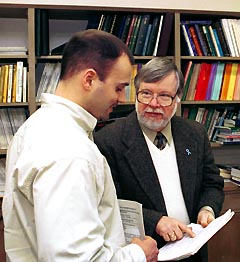|
This is an archived article.
For the latest news, go to the Advance
Homepage
For more archives, go to the Advance Archive/Search Page. |
||
|
Researchers Say Most Prostate
Cancer Survivors Cope Well By Allison Thompson
A recent study by UConn researchers shows that prostate cancer survivors fare relatively well, and rarely deem the diagnosis to be a traumatic or life-altering event. Each year, approximately 190,000 men in America are diagnosed with prostate cancer. There are more than 1.3 million prostate cancer survivors in the country.
"Over two-thirds of men we surveyed reported that they now hardly ever or never think about the fact that they have had prostate cancer," says Thomas Blank, a professor of family studies. "Thus, while a small percentage of men see themselves as dramatically affected in positive or negative directions, the overall picture is one of what is most easily described as successful adaptation." Although the study predates it, state and national attention has been focused on the disease recently, since UConn men's basketball head coach Jim Calhoun's successful surgery for prostate cancer last month. Blank and graduate student Keith Bellizzi studied nearly 500 men who had been diagnosed with prostate cancer from one to eight years before their participation in the research project. The men, who ranged in age from 48 to 88, answered questions about personality factors, coping strategies and choices, lifestyle factors, and aspects of the disease. "The overall tone of the responses was highly positive," Blank says. "Scores overall were equal to or higher on positive measures, such as optimism, and lower on negative ones, such as depression, than comparable national samples of older people." Blank and Bellizzi have reported their research findings at a national conference sponsored by the American Cancer Society and National Cancer Institute, and at recent meetings of the Gerontological Society. Age at diagnosis is a critical factor in determining how a man will be affected by prostate cancer, the researchers found. Specifically, men who were under 60 years old when they were diagnosed with the disease were more affected by the disease than were older men. But although they were more negatively affected than were men between 60 and 70 and those over 70, they also felt more control over and greater understanding of the disease, Blank and Bellizzi note. They made more adaptive changes following their diagnosis, saw more benefits, and had more desire to be in control. They also were more hopeful about their futures. The researchers also studied the relationship between disease characteristics and treatment choices and hope, optimism, and adaptive changes. They found that the lower the patient's Gleason score - a measure of the cancer's aggressiveness - the higher his hope and optimism scores. They also discovered that those who chose to treat the cancer with surgery, as opposed to radiation, made significantly more adaptive changes following the diagnosis of cancer. Those same men also scored higher on hope for the future than did men who chose to be treated with radiation. The treatment effects, however, may be partly explained by the fact that younger men are more likely to choose surgery and older men radiation. The researchers also found that time since diagnosis influenced a survivor. For example, men who had been diagnosed with prostate cancer two years or less before the study scored higher on measures of hope and optimism than did those who had been diagnosed three to four years earlier. The men who had been diagnosed three to four years ago were more depressed than other groups, including those diagnosed more than four years earlier. The men in the study were also asked about their attendance at support group meetings. Ten percent had regularly attended a support group for prostate cancer survivors, while 77 percent had never attended a meeting. Blank and Bellizzi discovered that support group attendees made more adaptive changes, used more positive coping strategies, and saw more benefits from having prostate cancer. They were also worse off in a number of ways, however. For example, they thought about their prostate cancer more, and scored higher on depression, impact of events, negative affect, and some negative coping strategies. "In other words, survivors who attend support group meetings are more affected overall," says Blank. "Attendance cuts both ways, and is a real chicken-and-egg question in terms of interpretation , since it's not clear whether the men are more affected because they attend the meetings or attend the meetings because they're more affected." Though the results show that a diagnosis of prostate cancer does have some negative effects, Blank and Bellizzi are encouraged by the fact that the majority of the survivors they studied coped well with the disease. Says Bellizzi: "We feel it is truly heartening in a broader social and quality-of-life sense that men who have experienced the trauma and difficulties of prostate cancer and treatment - and in many cases, significant permanent negative effects of that treatment, as well as the obvious hoped-for positive effect - live lives that are satisfying and that they perceive to be of high quality." Bellizzi recently received a National Cancer Institute Cancer Research Postdoctoral Fellowship to follow his research agenda on growth and change in response to cancer, in part because of his work with Blank. |
 lthough researchers have
made great strides in treating prostate cancer, the most common
non-skin cancer among American men, less attention has been given
to how a patient is affected by a diagnosis of the disease and what
his subsequent life is like.
lthough researchers have
made great strides in treating prostate cancer, the most common
non-skin cancer among American men, less attention has been given
to how a patient is affected by a diagnosis of the disease and what
his subsequent life is like.
